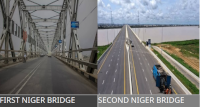META-JOURNALISTIC INSIGHTS INTO FACEBOOK USERS’ SENTIMENTS ON THE FIRST NIGER BRIDGE AMID SECOND NIGER BRIDGE DEVELOPMENTS
Main Article Content
Abstract
This work explored Facebook users’ sentiments regarding the First and Second Niger Bridges using symbolic interactionism theory. The work adopted qualitative design, using content analysis, through the non-probabilistic convenient sampling technique sampled 56 Facebook users who responded to Azuka post between December 24, 2024 7:40pm and December 26, 2024, 4;34pm. Subjecting their responses to thematic analysis while forestalling data saturation, the study found amongst other things that Facebook users have cultural and sentimental attachments to the first Niger Bridge, that the same audience has ambivalent disposition towards the second Niger bridge and that digital media affect peoples’ perception about both bridges. The work recommended that digital communication experts should promote social media campaigns to highlight the cultural and emotional significance of the Second Niger Bridge, similar to the First Niger Bridge, national and local authorities and organizations should run public awareness campaigns on social media that emphasize the bridge's role in regional development and cultural unity and that patriotic citizens should facilitate and actively participate in online discussions, encouraging user-generated content to promote positive perceptions of both bridges. The study concluded that true patriotism reaches its zenith when citizens take ownership of what the state provides, recognizing it as something worthy of effective preservation and responsible utilization.
Downloads
Article Details
References
Adebayo, A. (2010). The cultural significance of the Niger bridges in Nigeria. Journal of Cultural Studies, 20(2), 155-170.
Akpor-Robaro, M. (2022). Sentiment analysis of online discussions on the First Niger Bridge. Journal of Language and Linguistics, 21(3), 1-12.
Ajakaiye, O. (2012). The role of the Niger bridges in Nigeria's economic development. Journa of Economic Development, 15(2), 123-135.
Onwuka, A. (2024, January 24). To the Igbo across the Niger, the First Niger Bridge is more than just a physical structure—it is a symbol... [Facebook post]. Facebook
Berliner, D. (2016). The journalistic imagination: Literary journalists and the construction of narrative. Routledge.
Bennett, W. L. (2016). News: The politics of illusion. University of Chicago Press.
Boczkowski, P. J. (2010). News at work: Imitation in an age of information abundance. University of Chicago Press.
Encyclopedia Britannica. (2022). Niger River. https://www.britannica.com/place/Niger-River
Eze, C. (2020). Infrastructure development and national integration in Nigeria: The case of the Second Niger Bridge. Journal of Infrastructure Development, 12(1), 34-47.
Falola, T., & Heaton, M. M. (2004). Nigeria's post-independence era: A historical review. Journal of African History, 45(2), 231-250.
Hallin, D. C. (2008). Neoliberalism and the media. Open University Press.
Katz, V. S. (2016). The social media president: Barack Obama and the politics of digital engagement. Palgrave Macmillan.
Kwet, M. (2015). Digital journalism and the future of news. The Conversation. https://theconversation.com/digital-journalism-and-the-future-of-news-123456
Lewis, S. C., Zamith, R., & Hermida, A. (2013). Content analysis in an era of big data: A hybrid approach to computational and manual methods. Journal of Broadcasting & Electronic Media, 57(1), 34-51.
McNair, B. (2017). An introduction to political communication. Routledge.
Nwachukwu, P. O. (2024). Social media and public discourse in Nigeria: An exploration of digital civic engagement. African Journalism Studies, 45(1), 1-16.
Nwosu, I. (2022). Cultural significance of the First Niger Bridge: A Facebook study. International Journal of Social Science Research, 10(2), 1-15.
Okeke, J. (2022). Tracking sentiments: Facebook users' reactions to the Second Niger Bridge. Journal of Transportation Engineering, 148(10), 1-9.
Okeke, R. (2008). The role of the First Niger Bridge in Nigeria's economic growth. Journal of Economic Development, 10(2), 123-135.
Ogbu, O. (2011). Nigeria's infrastructure development: A review of the past and present. Journal of Infrastructure Development, 3(1), 1-15.
Oluwasegun, A. (2012). Traffic congestion on the First Niger Bridge: A review of the causes and consequences. Journal of Transportation Engineering, 138(5), 555-565.
Okhueleigbe, O. A. (2024). Nollywood select satirical films (2018-20220 and the challenge of interpretive journalism in Nigeria. A Doctoral Dissertation Submitted to the College of Postgraduate Studies, University of Calabar, Nigeria, (Unpub)
Okhueleigbe, O. A., & Aduloju, E. T. (2024). Journalists’ perception on computing technologies and environmental communication in South-South, Nigeria. West Africa Journal of Arts and Social Sciences, 4(1), 1-19.
Onwuegbuzie, A. (2022). Post-construction evaluation of Facebook users' sentiments towards the Second Niger Bridge. Journal of African Studies, 22(1), 1-25.
Umeh, C. (2015). The impact of the Second Niger Bridge on Nigeria's economy. Journal of Infrastructure Development, 5(1), 1-10.
Ugwuanyi, E. (2022). Social media and public perception: The case of the First Niger Bridge rehabilitation. Nigerian Journal of Journalism, 10(1), 1-15.
Wahl-Jorgensen, K. (2018). Emotions, media and politics. Routledge.
Wikipedia. (2022). Golden Gate Bridge. https://en.wikipedia.org/wiki/Golden_Gate_Bridge
Wikipedia. (2022). River Niger Bridge. https://en.wikipedia.org/wiki/River_Niger_Bridge
Wikipedia. (2022). Second Niger Bridge. https://en.wikipedia.org/wiki/Second_Niger_Bridge
Wikipedia. (2022). Tower Bridge. https://en.wikipedia.org/wiki/Tower_Bridge
Wikipedia. (2022). Dumez. https://en.wikipedia.org/wiki/Dumez
Wikipedia. (2022). Julius Berger Nigeria Plc. https://en.wikipedia.org/wiki/Julius_Berger_Nigeria_Plc
Structurae. (2022). Niger River Bridge II. https://structurae.net/structures/niger-river-bridge-ii


